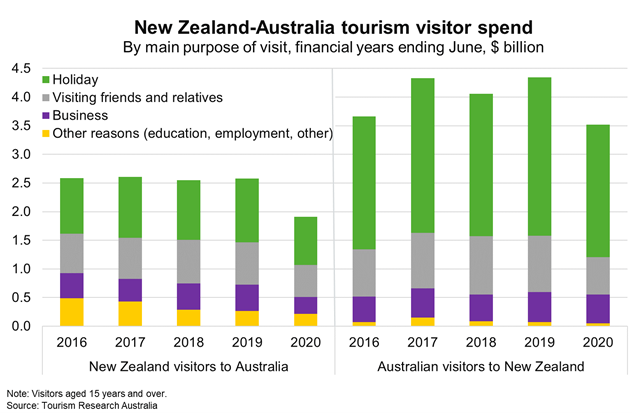Australia—Quarantine-free safe travel zone with New Zealand to boost some service industries
The two-way quarantine-free safe travel zone between New Zealand and Australia should boost business and consumer confidence and certain service industries. The return of some international travel should support greater activity in the airline industry, including travel agents. More Australian jobs in these industries are likely to be created as the trans-Tasman route is one of the busiest in terms of travel volume. Travel will initially likely be driven by people visiting family and friends; there are around 670,000 New Zealanders living in Australia and around 70,000 Australians living in New Zealand.
Potential spillover benefits to accommodation, restaurants, retail and other services could provide an economic boost. That said, the boost from traveller visiting family and friends is smaller than holidaymakers, because these visitors tend to spend much less. Further, traditionally more Australians travel to New Zealand than vice versa. New Zealand travellers spent on average about $2.5 billion per year in Australia from 2016-19 while Australians spent more than $4 billion per year in New Zealand (Chart). To the extent that there is substitution of domestic travel for holidays to New Zealand, this will dilute the economic benefits. However, the ongoing risk of COVID outbreaks and border closures, may limit the extent of outbound holiday travel from Australia.
The expansion of quarantine-free travel zones to other countries, potentially in the Pacific and Asia, would provide a bigger lift to Australian tourism and related businesses. However, reopening Australia’s borders is likely to be a gradual, based on health advice. Therefore, prospects of further opening of Australia’s international borders in the short-term is uncertain. Some regional countries have suggested reopening to international travel based on vaccination rollout, including reaching herd immunity through vaccination. The Australian Government has not yet taken a decision on whether vaccination status will facilitate entry to Australia, and the WHO has advised governments against requiring proof of COVID-19 vaccination for international travel at this time. This combined with the slow roll-out of vaccines in many parts of the world, both because of shortages of supply and because of vaccine hesitancy, means a return to more normal levels of inbound and outbound tourism from Australia remains some way off.

